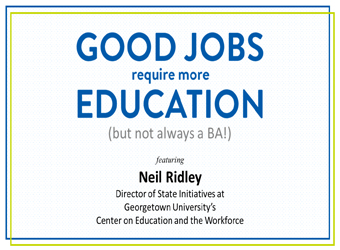 While labor economists predict that 60% of all jobs by 2025 will require a postsecondary credential, there is a common misconception that a bachelor’s degree is the only pathway to career success. Join FCAN and Georgetown University’s Center on Education and the Workforce on a webinar to learn about the growth of good jobs that have gone to workers with associate’s degrees, postsecondary certificates or industry certifications.
While labor economists predict that 60% of all jobs by 2025 will require a postsecondary credential, there is a common misconception that a bachelor’s degree is the only pathway to career success. Join FCAN and Georgetown University’s Center on Education and the Workforce on a webinar to learn about the growth of good jobs that have gone to workers with associate’s degrees, postsecondary certificates or industry certifications.
Good jobs are those that pay at least $35,000 for workers under age 45 and $45,000 for workers age 45 and older. While the number of good jobs has risen since 1991, they are increasingly going to workers with more than a high school diploma. This research is part of a new report and project lead by the Center, which aims to highlight the workforce and economic opportunities that exist for workers with associate’s degrees and other high-quality credentials.
Join Neil Ridley, labor economist and director of state initiatives at Georgetown University’s Center on Education and the Workforce and Troy Miller, FCAN’s associate director for research and policy for a look at new data that shows where good jobs in Florida are today—and the credentials needed to prepare for those jobs.
In this webinar we will cover:
- Trends that show the loss of jobs requiring a high school diploma or less
- How 4-year degrees are not the only viable option to land a good paying job
- The distinctions between sub-bachelors credentials (certificates, certifications and associates degrees)
- What the new report Good Jobs that Pay Without a BA from Georgetown University’s Center on Education and the Workforce means for Florida
- An overview of Florida data featured in the report
Webinar: Good jobs require more education (but not always a BA!)
Date and Time: January 11 from 2:00 to 3:00 p.m.
Registration link: https://attendee.gotowebinar.com/register/1241166496200570626
RELATED ARTICLES:
Visit FCAN’s Past Webinars page
Florida offers third highest number of good jobs for workers without a bachelor’s degree
